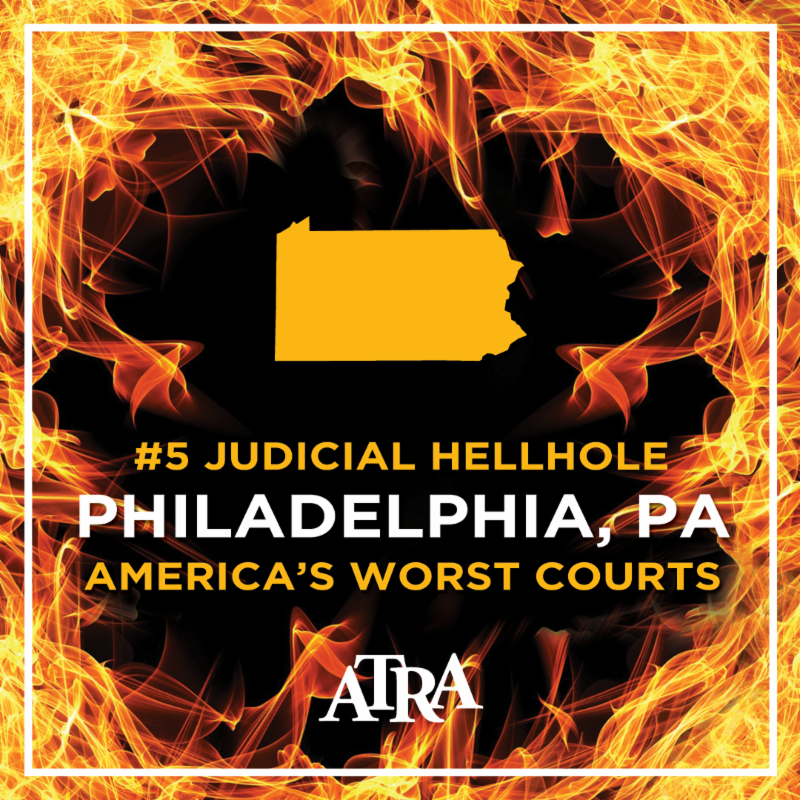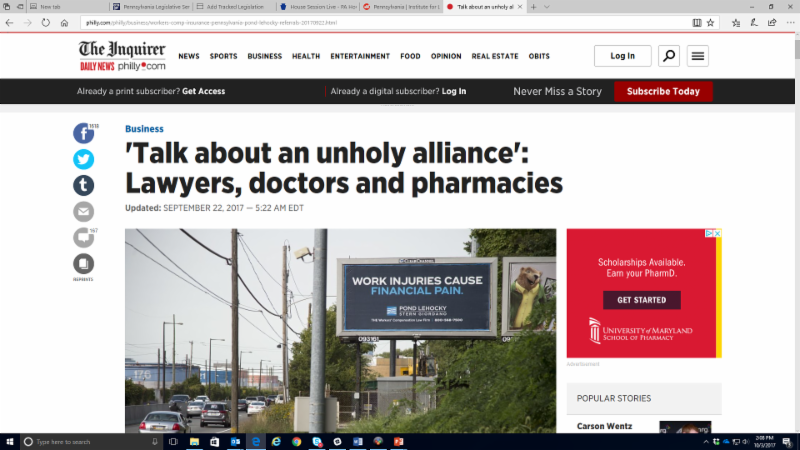PA Superior Court: Fair Share Act Applies to Asbestos Strict Liability Cases; Settlements With Bankruptcy Trusts Must Be Included in Calculating Liability Under Fair Share Act!
In a major opinion upholding the clear language and legislative intent of Pennsylvania’s Fair Share Act, a three-judge panel of the Pennsylvania Superior Court in
Roverano v. John Crane, Inc. has ruled that the Act applies to the allocation of liability in all strict liability cases.

Passed in 2011, the Fair Share Act apportions liability according to fault unless a defendant is sixty percent or more at fault. In a sixty percent plus liability situation, the defendant can be required to pay the entire verdict.
In
Roverano the plaintiff sued numerous defendants in an asbestos action. At trial, several defendants asked the court to apportion damages according to the extent each defendant caused harm. The trial judge, saying that he had never heard of asbestos liability being “quantified,” determined that the Fair Share Act did not apply to this case.
The Superior Court rejected this finding and stated “…the Fair Share Act specifically applies to tort cases in which recovery is allowed against more than one person, including actions for strict liability.” The Superior Court vacated the trial court’s ruling that the Fair Share Act did not apply and remanded the case for a new trial to apportion liability.
The Superior Court then addressed the issue of bankruptcy trusts that had settled with the plaintiff. Citing Section 702(a.1)(1) of the Fair Share Act, the court stated “These provisions require that settlements with bankrupt entities be included in the calculation of allocated liability under the statute.” While this is a positive result, the case does not eliminate the need for asbestos transparency legislation. In Footnote 11, the court stated:
Appellants concede that this requirement is subject to the
qualification that they “submit evidence to establish that
the non-parties were joint tortfeasors.” See Amato v.
Bell & Gossett, 116 A.3d 607, 617 (Pa. Super. 2015), appeal
dismissed sub nom. Vinciguerra v. Bayer CropScience, Inc.,
150 A.3d 956 (Pa. 2016). In addition, we agree with
Appellees that Section 7102(a.2) does not apply to
bankrupt entities (or their successors in interest)
with whom they have not settled and received releases.
PCCJR will continue to watch this case on remand and any subsequent appeals.
PCCJR Comments on Judicial Hellholes Report

Reaction to Pennsylvania’s double-whammy inclusion in the December release of the American Tort Reform Association’s
“Judicial Hellhole” report continues. The PennRecord’s Nicholas Malfitano recently wrote
an articleabout the reactions and the ironic $28.8 million Xalerto verdict out of the Philadelphia Court of Common Pleas that came the same day the report was released.
While the Philadelphia Bar Association is pushing back on the “Judicial Hellhole” designation, PCCJR Executive Director Curt Schroder is standing firm that the massive Xalerto verdict and the report demonstrate that the courts aren’t treating businesses fairly and the results are impacting job creation and the availability of health care.
“The ATRA Judicial Hellholes report is a stark reminder that in Pennsylvania, employers and health care providers still face an uphill struggle in court, especially in the Philadelphia County Court of Common Pleas,” Schroder said in
the article pointing out that the punitive damages awarded in the Xarelto case were 14 times the amount of compensatory damages. “The findings in this report are consistent with other studies that have been critical of the impact of Pennsylvania’s courts on job creation and health care availability.”
Cookie Jar Slams Shut on Pond Lehocky Pharmacy
Last fall, Philly.com blew the lid off the pharmacy scheme of the workers’ compensation law firm Pond Lehocky Stern

Giordano. The firm, they reported, regularly refers clients to doctors who in turn refer patients to the firm’s mail-order pharmacy, Workers First. Now, the same publication reports:
“Workers’ comp firm dumping control of controversial mail-order company.”According to the report, three of the firm’s partners previously registered as owners of the pharmacy are no longer part of a new list of proposed controlling interests recently submitted to state regulators.
The practice of lawyer-owned pharmacies is rife with potential conflicts of interest and increased medical costs. The original investigative report even found Workers First billing insurance companies as much as $4,000 a tube for cream medications that are not approved by the Food and Drug Administration. That example of legal bad faith is not remedied by the change in ownership.
PCCJR weighed in on the troublesome practice in a commentary
“Pa. civil justice system in need of reform” calling for an investigation by the Disciplinary Board of the state Supreme Court and enactment of House Bill 18, which would establish a prescription drug formulary to ensure injured workers receive appropriate care. The state Senate introduced a similar bill to limit drugs permitted under the state’s workers’ compensation laws in October.
Mass tort programs and large awards make Legal Intel’s 2017 highlight reel
It will be of no surprise to readers of this update that large awards coming from mass tort programs were among the 2017 highlights of the Philadelphia legal community according to The Legal Intelligencer. Among them, the $57.1 million verdict against Ethicon over allegations its pelvic mesh product was defective and a second jury award of $20 million over similar claims. Also mentioned, the $27.8 million Xarelto verdict, even after the defense won in three cases as part of the consolidated litigation in federal court. Read the full article here. Note: The Legal Intelligencer has a paywall, but allows up to 5 free articles per month.
PA Civil Justice Reform Needs You and More Like You! 
PCCJR focuses exclusively on civil litigation reform and provides a voice for those who are concerned about the problem of lawsuit abuse in Pennsylvania. The coalition works hand-in-hand with other advocates for civil justice fairness to ensure our elected officials understand the extent of the problems and the importance of acting now to address them. Be sure to keep up with the latest in our efforts to improve Pennsylvania’s legal climate and bring fairness to the courts at https://paforciviljusticereform.org and share membership information with others willing to lend their voice to our efforts.

 Reaction to Pennsylvania’s double-whammy inclusion in the December release of the American Tort Reform Association’s “Judicial Hellhole” report continues. The PennRecord’s Nicholas Malfitano recently wrote an articleabout the reactions and the ironic $28.8 million Xalerto verdict out of the Philadelphia Court of Common Pleas that came the same day the report was released.
Reaction to Pennsylvania’s double-whammy inclusion in the December release of the American Tort Reform Association’s “Judicial Hellhole” report continues. The PennRecord’s Nicholas Malfitano recently wrote an articleabout the reactions and the ironic $28.8 million Xalerto verdict out of the Philadelphia Court of Common Pleas that came the same day the report was released. Giordano. The firm, they reported, regularly refers clients to doctors who in turn refer patients to the firm’s mail-order pharmacy, Workers First. Now, the same publication reports: “Workers’ comp firm dumping control of controversial mail-order company.”
Giordano. The firm, they reported, regularly refers clients to doctors who in turn refer patients to the firm’s mail-order pharmacy, Workers First. Now, the same publication reports: “Workers’ comp firm dumping control of controversial mail-order company.”



